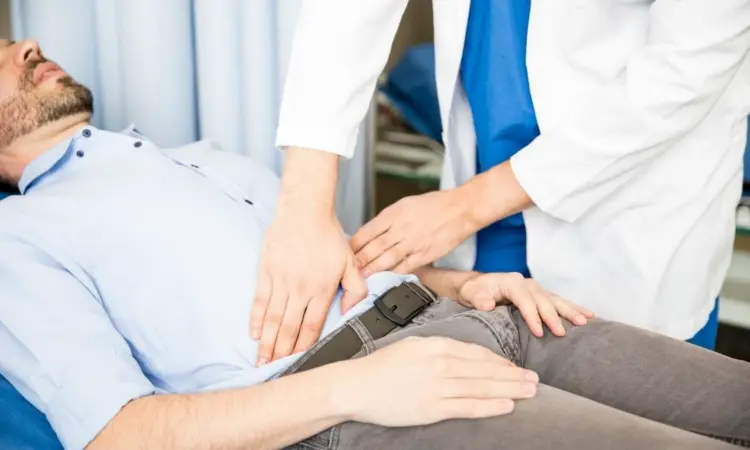- Home
- Medical news & Guidelines
- Anesthesiology
- Cardiology and CTVS
- Critical Care
- Dentistry
- Dermatology
- Diabetes and Endocrinology
- ENT
- Gastroenterology
- Medicine
- Nephrology
- Neurology
- Obstretics-Gynaecology
- Oncology
- Ophthalmology
- Orthopaedics
- Pediatrics-Neonatology
- Psychiatry
- Pulmonology
- Radiology
- Surgery
- Urology
- Laboratory Medicine
- Diet
- Nursing
- Paramedical
- Physiotherapy
- Health news
- Fact Check
- Bone Health Fact Check
- Brain Health Fact Check
- Cancer Related Fact Check
- Child Care Fact Check
- Dental and oral health fact check
- Diabetes and metabolic health fact check
- Diet and Nutrition Fact Check
- Eye and ENT Care Fact Check
- Fitness fact check
- Gut health fact check
- Heart health fact check
- Kidney health fact check
- Medical education fact check
- Men's health fact check
- Respiratory fact check
- Skin and hair care fact check
- Vaccine and Immunization fact check
- Women's health fact check
- AYUSH
- State News
- Andaman and Nicobar Islands
- Andhra Pradesh
- Arunachal Pradesh
- Assam
- Bihar
- Chandigarh
- Chattisgarh
- Dadra and Nagar Haveli
- Daman and Diu
- Delhi
- Goa
- Gujarat
- Haryana
- Himachal Pradesh
- Jammu & Kashmir
- Jharkhand
- Karnataka
- Kerala
- Ladakh
- Lakshadweep
- Madhya Pradesh
- Maharashtra
- Manipur
- Meghalaya
- Mizoram
- Nagaland
- Odisha
- Puducherry
- Punjab
- Rajasthan
- Sikkim
- Tamil Nadu
- Telangana
- Tripura
- Uttar Pradesh
- Uttrakhand
- West Bengal
- Medical Education
- Industry
Direct Percutaneous Endoscopic Jejunostomy Effective Alternative to surgical jejunostomy for Feeding Access

A recent retrospective study by John Locke and team suggests important inputs on the efficacy and safety of various methods for jejunostomy tube placements which provides enteral access for patients who are unable to meet nutritional needs orally. The findings were published in the journal of Gastrointestinal Endoscopy.
The study was conducted to compare procedural success rates and complications by examining three approaches: direct percutaneous endoscopic jejunostomy (DPEJ), laparoscopic (lap-J), and open laparotomy (open-J). These methods are imperative for patients who require alternative feeding routes due to their inability to consume sufficient nutrients orally.
The research was based on data from 201 patients which was classified into DPEJ, lap-J, and open-J cohorts, demonstrated comparable procedural success rates among the three groups (DPEJ 96.9%, Lap-J 99.1%, Open-J 100%, p=0.702). The infection and bleeding rates were also similar across the board with no reported cases of gastrointestinal perforation.
This study uncovered significant findings related to tube dysfunction within 90 days. The cases requiring complete removal and/or replacement were notably lower in the DPEJ group (0%) when compared to the surgical groups (lap-J 35.1%, open-J 40.0%, p<0.001). This discrepancy was primarily from increased incidents of tube clogging and dislodgement in the surgical approaches.
The findings of the study concludes that DPEJ emerges is a safe and effective alternative to surgical jejunostomy for eligible patients. DPEJ might offer a potential advantage beyond its efficacy by significantly reducing the complication rates at the critical 90-day mark. This outcomes are important for medical practitioners and patients who seek optimal enteral access solutions when considering the postoperative recovery and maintenance aspects of the jejunostomy tube placements.
Reference:
Locke, J., Norwood, D., Forrister, N., Ahmed, A. M., Aryan, M., Oster, R., Reddy, S., Kabir Baig, K. K., & Peter, S. (2023). Safety and Efficacy of Direct Percutaneous Endoscopic Jejunostomy Tube Placement Compared with Surgical Jejunostomy: A Tertiary Care Analysis. In Gastrointestinal Endoscopy. Elsevier BV. https://doi.org/10.1016/j.gie.2023.12.013
Neuroscience Masters graduate
Jacinthlyn Sylvia, a Neuroscience Master's graduate from Chennai has worked extensively in deciphering the neurobiology of cognition and motor control in aging. She also has spread-out exposure to Neurosurgery from her Bachelor’s. She is currently involved in active Neuro-Oncology research. She is an upcoming neuroscientist with a fiery passion for writing. Her news cover at Medical Dialogues feature recent discoveries and updates from the healthcare and biomedical research fields. She can be reached at editorial@medicaldialogues.in
Dr Kamal Kant Kohli-MBBS, DTCD- a chest specialist with more than 30 years of practice and a flair for writing clinical articles, Dr Kamal Kant Kohli joined Medical Dialogues as a Chief Editor of Medical News. Besides writing articles, as an editor, he proofreads and verifies all the medical content published on Medical Dialogues including those coming from journals, studies,medical conferences,guidelines etc. Email: drkohli@medicaldialogues.in. Contact no. 011-43720751


